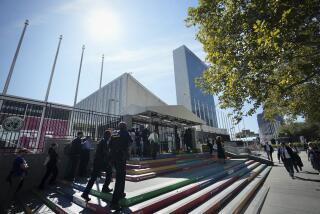Statesmanship Over Cyprus
- Share via
The leaders of the Greek and Turkish Cypriot communities have agreed to meet at the United Nations in a fresh effort to solve the problems of Cyprus at the summit on Jan. 17. Their agreement is a welcome act of statesmanship in a situation riven with historic animosities that always generate more reasons to disagree than to agree.
This agreement also is a credit to Javier Perez de Cuellar, secretary general of the United Nations, and his staff, who spent months narrowing issues to the point where direct talks between leaders of the two nations were justified.
The United Nations has had a special stake in peace for Cyprus since 1964, when the Security Council established the U.N. Peacekeeping Force in Cyprus, an international team that has tried to maintain a semblance of law and order on the island. In December the Security Council voted the mandate for a six-month extension of that force.
President Spyros Kyprianou of Cyprus, leader of the Greek Cypriot majority, and Rauf Denktash, leader of the Turkish Cypriots, who claim their own sovereign enclave on the island, will be the principal figures at the New York meeting later this month. Their agenda is confidential, but the major problems that they need to resolve are no secret. An equitable territorial decision is required, righting the present division that resulted from the Turkish invasion of the island a decade ago to defend Turkish Cypriots in the face of a Greek-sponsored coup. The Turkish Cypriots, with 19% of the population, now control almost 38% of the republic. And a new form of shared government must be devised, ending the outrage of the Turkish Cypriots’ unilateral declaration of independence for the northern region that they control, but providing assurances that the Turkish-Cypriot minority’s rights will be secure and respected.
In the brief time since the summit was scheduled, some unhelpful things have been said, betraying the old habits of rigidity that have exacerbated the communal problems of the island. But both Greece and Turkey, with their special treaty obligations, have behaved responsibly, according to informed diplomats. That enhances the prospect for progress.
Progress has a special importance beyond the urgent need for peace on the island itself. Communal divisions on this small island have in the past threatened division in the Atlantic community, generating more hostility between the easternmost allies, Greece and Turkey, while embarrassing the U.S. relationship with its allies.
The restoration of trust will take time. But the summit represents an extraordinary opportunity to begin that process.
More to Read
Sign up for Essential California
The most important California stories and recommendations in your inbox every morning.
You may occasionally receive promotional content from the Los Angeles Times.












